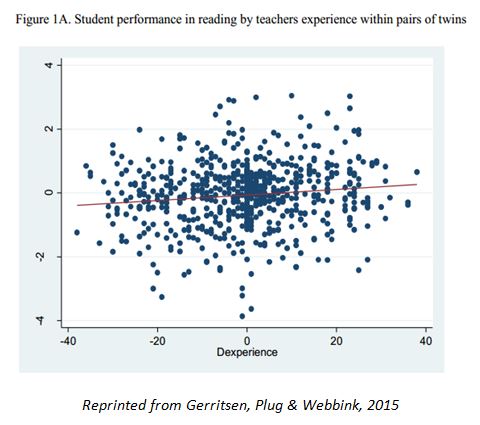We
were heartened to find not one–but two–education studies this month using data
gleaned from twins to answer research questions about teacher quality and
classroom performance. This is a novel approach for education research,
although it’s quite common in other kinds of social science research. The
working theory is plausible (though not foolproof): by comparing how twins
perform under different teachers, researchers can pull out real differences
attributable to schools and not students’ backgrounds.
A
Netherlands study takes advantage of a policy in
Dutch schools where twins are always assigned to different classrooms to
examine the impact of teacher experience on student achievement. Researchers
were able to compare the academic outcomes for 495 twin sets in grades 2, 4, 6
and 8.
Early
in their schooling, twins’ scores in grade 2 show meaningful (and statistically
significant) differences based on the experience of their teachers. For each
additional year of experience one twin’s teacher had over the other’s, there
was about 1.5 percent of a standard deviation’s growth; that may sound small, but over time that difference
adds up.
The
researchers think that an examination of twins’ performance is an especially
robust idea for early grades because there’s little chance that students would
have been sorted into classes based on their academic abilities at so young an
age.
That might explain why in higher grades, the
impact of teacher experience decreases: the effect on students in grades 4 and
6 is only found in reading and all gains due to teachers’ years of experience
disappear in grade 8.

The most interesting finding here may be that there was no
evidence of the ‘plateau effect’ from experience that American studies
frequently find at about year five in a teacher’s career. Rather, the effect of
experience found in this study is linear, meaning that a 20-year veteran is
consistently more effective than a 15-year veteran who is consistently more
effective than a 10-year veteran, and so on.
Back in the U.S., another twin study also looks at the
relationship between teacher characteristics and student outcomes. The research
considers master’s degrees (where no relationship with student outcomes has
ever been soundly documented), national board certification (where a
relationship has been found that correlates with increased student outcomes)
and teacher experience. Of the three factors, teacher experience seemed to be
the teacher characteristic most strongly related to student outcomes. Unlike
the Netherlands study, though, the effect of a teacher working longer tapers
off, as almost every American study has shown, after about a five-year career.
